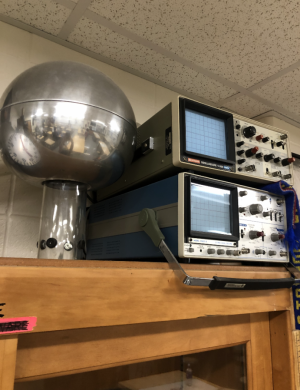The fear of physics: Why students on the science honors track dread their junior year
May 12, 2021
Access to honors classes is not an issue for students at PV. Students are offered a multitude of courses to choose from, each in varying subject areas. However, there has been one pressing issue for every incoming freshman class: choosing the honors track for science freshman year.
When the curriculum for science courses at the high school changed, students were left with an ultimatum. The science standards required for graduation included learning earth science. However, freshmen were offered the choice of taking Honors Biology or Earth Science their first year of high school.
Freshmen who took the earth science course were able to complete that part of the graduation requirement. But students who chose to take the honors biology course were locked into the honors track for the rest of their high school career.
The curriculum had divided the earth science standards into three parts, each part being embedded into each of the honors courses that students would take throughout their freshman, sophomore and junior years. The main issue surrounding this division is the AP Physics 1 course. This rigorous physics course was not what many students wanted to take.
Students still wanted to be on the honors track starting their freshman year, but the prospect of taking a rigorous AP course their junior year was frightening. If students were to drop out of the honors track at any point, they would have to take the earth science course to complete the graduation requirement.
This requirement poses many issues for both students and teachers. Students who decide to not take the honors track will miss out on courses that they would have otherwise enjoyed, simply because they did not want to be locked into a course they did not have an interest in taking. Teachers will also miss out on teaching eager students with intrinsic motivation to learn.
Junior Allisa Pandit was on the honors track for science but opted to not take AP Physics 1 junior year. “I decided to take General Physics and Earth Science this year because I needed to decrease my workload. I am already taking several AP and honors courses, so I wanted to make sure I still had time for my extracurriculars,” she said.
“I’ve heard past students say how difficult the course is, so I decided it’s probably not the class for me. I know a lot of my peers that ended up taking AP Physics regret it and were not passionate about the class throughout the year. Having to take Earth Science and General Physics at the same time drives more students to stick with AP Physics — even if they don’t want to,” Pandit continued.
Regret is not a useful feeling to have toward a class. Instead of pushing students to do better in the course, like passion does, it pushes them to resent the course and lose motivation to do the work.
Additionally, students who do take the honors track might reach the AP Physics 1 course with no motivation. This is harmful to the students, their classmates and the teacher. Without intrinsic motivation to learn and fully participate in the course, the student will not be able to achieve academically.
Other students in the class will be impacted too. A class filled with people who are not passionate about the course will reflect in the classroom atmosphere: silence, lack of communication and discourse. Ultimately providing students with a poor learning environment.
Senior Sophia Lindquist has felt the impact of unmotivated students in her own classes. “I have been in a couple classes where there was little discussion, but it honestly depended on the class as to whether that helped or hindered my learning. In some cases I enjoyed quiet because it allowed me to focus more on the material presented to me,” she explained.
Those negatives go both ways. It can become more difficult for a teacher to teach a group of students who are not interested in learning the material. The classroom participation will not be the same as if everyone was given the choice to take the class. That simple choice for students goes a long way. Students who want to learn that material will put in the effort to do so, more than students who were locked into taking the class.
Research shows that interest is a driving factor for academic success. The interest, or lack thereof, a student has in a particular course or topic can affect their learning for the better or worse. It needs to be up to the student to make decisions on what courses they want to take, allowing them to choose courses they are truly interested in.
For students on the honors track for science, they are on the path to take AP Physics 1 junior year; one of the most important years for high school students. Juniors and seniors typically have more room in their schedules to take the classes they want to, giving them an opportunity to choose classes that are geared towards their future plans. Taking this opportunity away from them at such an important time is unfair to students.
Lindquist feels as though it is essential for students to have freedom in picking courses. “I don’t believe that locking specific courses is good for learning because it is all dependent on a decision we made as incoming freshmen. Our interests change as we get older, and if we are not interested in that course anymore, we won’t put in the effort for it,” she expressed.
Though many students love AP Physics 1, it is unfair to force students into taking the course. Students who enjoy the course typically were interested in the contents of the class beforehand. This freedom to choose their course has helped students immensely in this class.
For PV, the science honors track has brought forth many issues for students. The freedom to choose classes is crucial for students, especially during their last couple of years in high school. As students come closer to adulthood, the need for classes that are focused on their passions are essential. Locking students into specific courses will be harmful for students, classmates and teachers. In a dilemma between students’ academic freedom and state curriculum requirements, why do schools fail to make decisions that benefit their students?









Jack Dumas • May 14, 2021 at 11:31 am
great article
Carson Albrecht • May 14, 2021 at 9:31 am
Honestly physics isn’t fun but I don’t think it’s harmful.